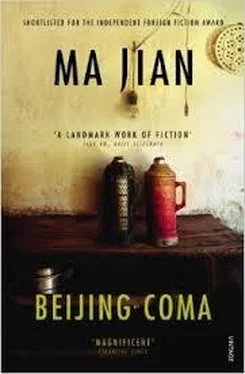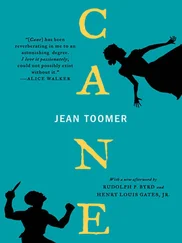‘A boy called Wang Nan was shot during the crackdown. The soldiers hid his body in a flower bed just east of the Zhongnanhai government compound. But the grave was so shallow that his body started poking up from the soil a few days later. Fortunately he was wearing an army uniform, so the authorities assumed he was an injured soldier. Otherwise, they would have sent his body to a secret crematorium, and his mother would never have found out what happened to him.’
They both fall silent. Wen Niao takes a sip of tea. I can smell jasmine in the steam rising from her teacup and in the air she exhales. I inhale, and feel her breath enter my lungs.
‘You forgot your watch here last time.’ My mother goes into the kitchen. ‘I’ll just fry this up. It won’t take long.’
‘I’m always mislaying that watch,’ Wen Niao says, walking into my room. ‘I’m so scatterbrained.’
I hear her swallow. I know she’s looking at me, scrutinising me as she would a caged rabbit in her research lab.
She takes my blood pressure, inspects the skin on my legs then carefully removes a few flakes of skin from behind my ears and places them in a screw-top jar to analyse later.
I hear her breathe in and out as she flicks through some sheets of paper. The air is as smooth as silk.
Her fingers move over my chest. They are warm, as warm as the breath she exhales. Her nails press into my skin for moment, then she pulls her hand away. My penis immediately stiffens. I want her to touch me again. She’s the first girl since Tian Yi to show any concern for me.
She notices my erection, lifts the sheet and observes it for some time. ‘It seems this vegetable has quite a healthy sexual appetite,’ she whispers.
I wish it would go down.
Then she says into my ear, ‘Don’t worry. I’m sure you’ll wake up one day. The drugs I’m giving you are imported. Do you hear me, wooden man? And I’ve told your mother lots of things she can do to speed up your recovery. I looked after many coma patients during my internship.’
This is the sixth time you’ve visited me, Wen Niao. One time you came on a Saturday. You said you hadn’t anything else to do that weekend.
‘You were very handsome seven years ago. There was always a crowd of people milling around you. I never dared look you straight in the eye.’
And I remember that your face was similar to Tian Yi’s: oval, and lightly freckled, but with thicker eyebrows and a higher-bridged nose.
‘At least you’re better off than those students who were sent to the Martial Law Headquarters and tortured so badly they went insane. They’re the ones I feel sorry for.’
Yes. I heard Shao Jian was detained at the Martial Law Headquarters after saying he’d seen students killed in Tiananmen Square, which the government still refuses to acknowledge. He was tortured for days until he finally agreed to write a statement refuting what he’d said. But he was sent to jail nevertheless.
‘If you wake up, we might make a good couple. So try a bit harder, will you?’
You told me that when you joined the research institute, you felt as though you were slipping into your grave. You don’t realise that the body itself is a grave. I dreamed about you the other night. You were locked in a drawer. I tried to pull it out, but it wouldn’t budge.
‘You’re a miracle. If you were in a foreign country, you’d be famous by now.’
Your voice keeps flitting up and down. I remember what a slender neck you have, and how I thought when I first met you that you must have a narrow larynx. I asked you which work unit you belonged to, and you glanced up at me and said, ‘You sound like a policeman.’
She wipes my eyes with a ball of cotton wool dipped in eye lotion. The little finger pressing against my face feels as though it’s entering my flesh.
‘Your corneas are infected. Even if you were to open your eyes one day, you probably wouldn’t be able to see much. Your mother should sew the lids together to prevent them getting reinfected.’ Her fingertips are cooler than her palm. Her sleeve brushes over my face as she moves her arm.
‘Your heart’s beating faster. You know that someone’s speaking to you, don’t you? What are you thinking?’
I’m thinking that whenever you walk into this flat, everything seems to come alive… Do you remember my girlfriend? She’s getting married. She’s set the date already: Christmas Day, 1999. She’s marrying a German architect. She says she’ll never come back to China again. She doesn’t want to live in a country where the police knock on your door every day.
All the windows are shut. You swelter in the heated flat like a half-steamed fish.
Mou Sen and I walked over to the Goddess of Democracy. We’d helped carry pieces of the statue into the Square the night before.
‘Someone climbed onto the scaffolding last night and tried to knock the statue over,’ Mou Sen says. ‘The students pulled him down, but let him go after a few minutes.’ As he spoke, he took off his imported beige jacket that I assumed Nuwa had bought for him.
‘What’s the matter with us?’ I said, ‘If someone vandalises the portrait of a tyrant, we arrest them, but if they try to destroy a symbol of democracy we let them go.’
Zhang Jie walked up and said, ‘Have you heard? Taiwanese students want to get a million people to link hands across Taiwan in solidarity with us… What happened to your cheek, Dai Wei?’ It was already very hot now, but he was still wearing his black leather jacket. I hadn’t seen him in the Square much since he’d returned to the campus after the hunger strike.
‘We broke up another coup last night,’ I explained. ‘The guy who punched me was wearing a ring with a hidden spike.’ I kicked aside an empty lemonade bottle lying in my path. The white polystyrene lunch boxes littering the ground were irritatingly bright. The night before, a student had stormed onto the Monument’s upper terrace with a group of friends and declared himself commander-in-chief. We had to use force to get them to leave. During the fight, Chen Di’s binoculars fell on the ground and smashed into pieces.
Zhang Jie smirked awkwardly, uncertain how to respond. He was the kind of aloof, insecure guy that girls find least attractive.
Mou Sen had persuaded Tang Guoxian and Wu Bin to help set up his Democracy University. During the preparatory meeting the day before, he’d appointed himself chancellor, made Nuwa general secretary, Tang Guoxian admissions officer, Old Fu vice chancellor and Little Chan head of public relations.
We soon found ourselves crushed in the excited crowd that had gathered around the statue. The white goddess, constructed of styrofoam and papier mâché, towered above us, her hands raising a torch towards the blue sky. She was as tall as a three-storey building. Her face was still concealed beneath a sheet of red silk.
‘So they managed to put it up in the end!’ Mou Sen cried. ‘Those art students must have worked through the night. Many Beijing residents came to help after you left. They were amazing. When the students were building the pedestal, they called for some saws, and immediately four or five saws appeared from nowhere. A few hours later, they said they were tired and could do with some congee, and within minutes, the residents wheeled over a trolley with enough congee to feed an army.’ Mou Sen was very excited. Tian Yi’s camera was hanging around his neck.
The crowd grew impatient. Students were setting up microphones and speakers at the foot of the statue. I spotted Wu Bin over there, supervising the security cordon that circled the base. He allowed us through the cordon and let us sit with the journalists. Student representatives from eight Beijing art colleges sat nearby, waiting to take part in the unveiling ceremony.
Читать дальше












